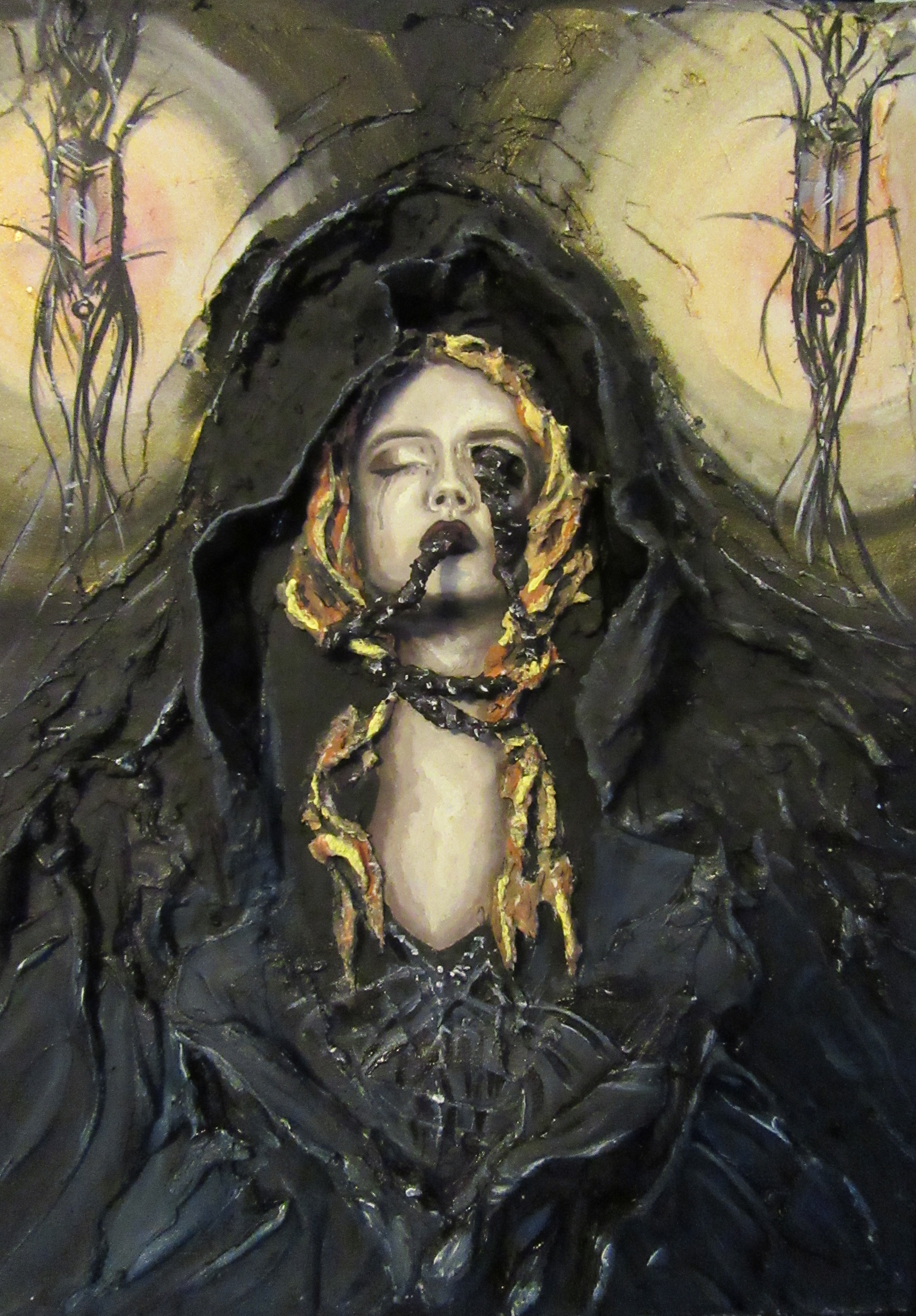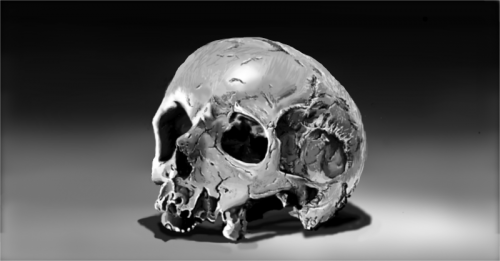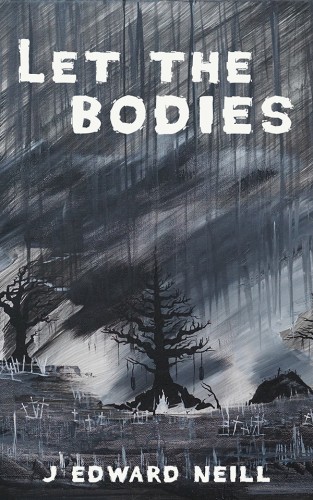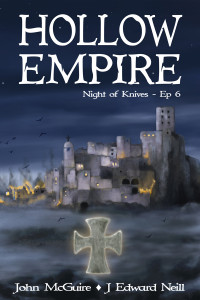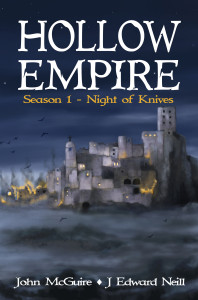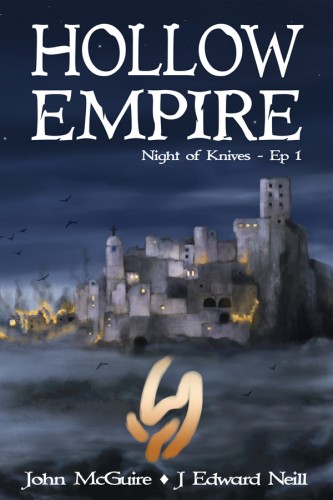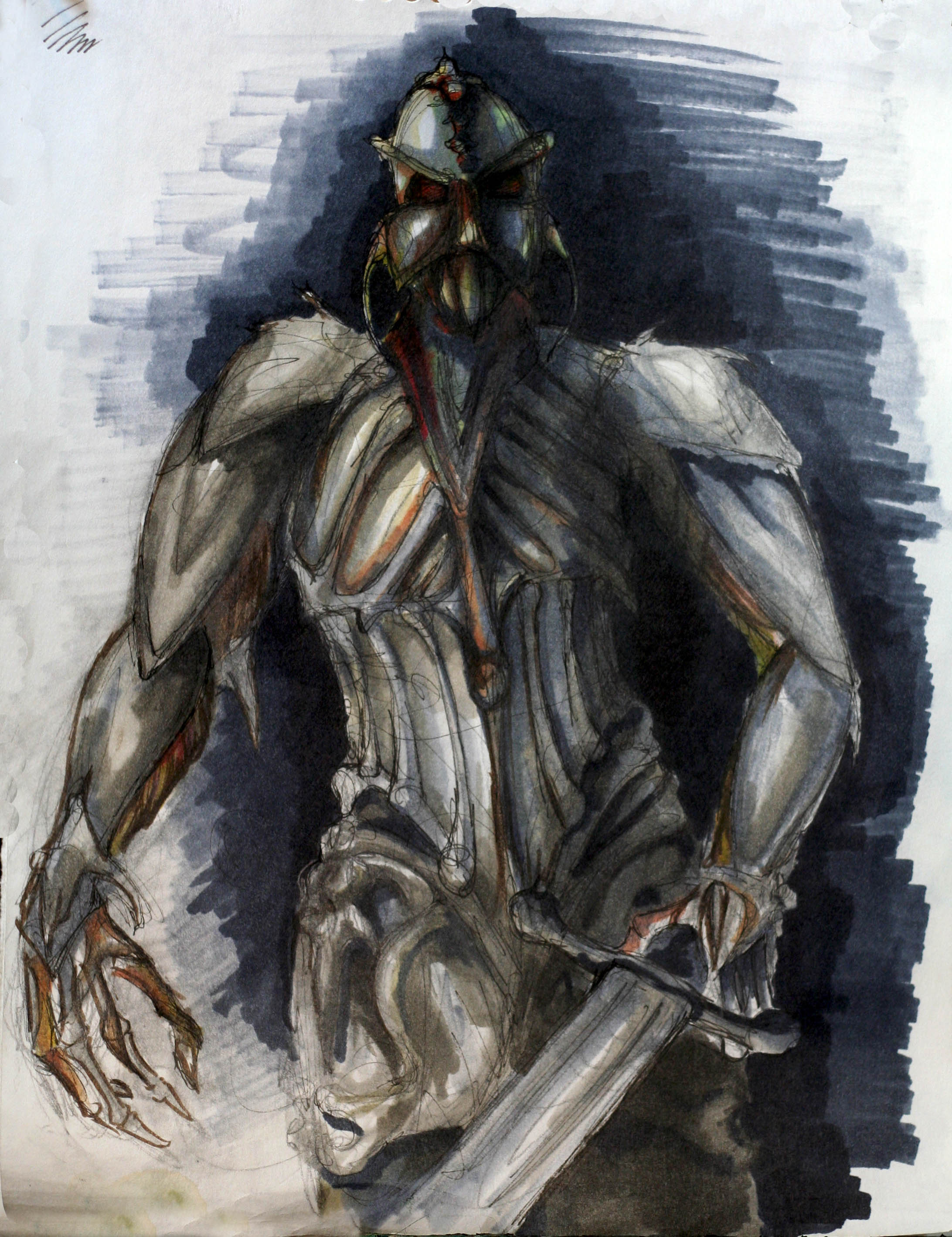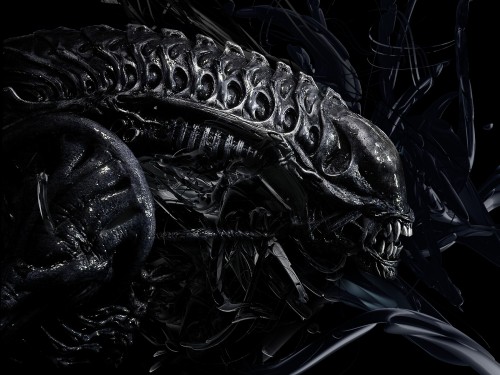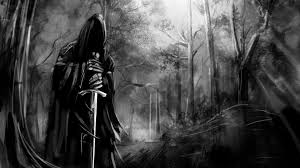*
*
* * *
The Skeleton Sculptor
J Edward Neill
*
On the morning the hunt began, we’d had a hundred men.
After three months, we were down to eleven.
We all knew how it would end.
But only a few got to see it.
My name is Costas. Those who knew me would’ve said I listened more than I talked. They’d have been right, of course. I was always a watcher more than a doer. I’d grown up in the Master’s service, in a mountain city graven of pale stone. In the Master’s Citadel, we had towers taller than anywhere else in the known world. We had women more beautiful than the sun, moon, and stars. Why talk, I thought, when surrounded by such glory?
And so I watched. And listened. And learned.
It was a perfect place, my home. I loved it.
And if I weren’t dead, I’d return there and never leave again.
* * *
Most of what I remember of our ninetieth night out was that my feet hurt. I sat beneath the full red moon, the campfire snapping at my toes, and I rubbed my soles until my fingers went numb.
For a short while, I didn’t care about all the men who’d gone missing.
I didn’t care about the Master’s orders.
All that mattered was that my sandals were off, my armor was loose on my shoulders, and my belly was full of stew. After all, there weren’t many of us left to eat the food we’d started with. There seemed no sense in dying hungry.
“It’s ten days home,” a soldier murmured across the dying campfire. “Which means if we leave tomorrow, one of us will survive.”
I looked at the other men. Five of us were hunkered in the scrub. We were sulking by the fire, our gazes inky in the night. The other six were asleep in two tents atop a nearby hill. I could see the lights of their fires dying the same as ours. The flames were red, just like the moon.
There was no wind that night. Only the scarlet light on the silent earth.
“So,” Aios grumped on the fire’s far side, “the one who makes it back home…he gets to die on the Master’s gallows ‘stead of out here in the grass.”
I listened while the argument began.
“We don’t know the others are dead,” Nikolas grunted. “Could be they’re hiding. Could be they’re lost in the hills somewhere.”
Nikolas wasn’t wrong, not exactly. We’d never actually found any of the bodies. But Aios knew better. So did I. Not that I said anything.
“As likely missing as swimming on the moon.” Aios glanced skyward. “They’re all dead and you know it.”
Philok, biggest of our cadre, rolled his massive shoulders. Tanned to gold by the sun, still packed into his hard leather hauberk, he was the only one of us who still looked fierce.
If any of us survive, I thought, it’ll be him.
“I want it to come,” Philok rumbled. “Let it skulk out of the darkness. I’ve a spear for it. There’ll be no more of our bones. Only its.”
It was wishful thinking, and we all knew it. Aios shook his head. Nikolas just looked afraid. Leuk peered over the fire, moonlight in his eyes, and went back to eating from his wooden bowl. He never talked, our Leuk. He was even quieter than me.
“Spears don’t kill ghosts,” murmured Aios.
“Mine might.” Philok glared.
Our huge friend had a point. His spear, a man and a half tall, leaned on a boulder near the fire. Its haft was as thick as most men’s forearms, its tip catching the moonlight just so. I’d seen Phi skewer a boar with it once. It’d split the poor, squealing thing in two.
But our quarry wasn’t a boar. It didn’t squeal. It didn’t die.
All it did was take the living away. And never bring them back.
The men argued more. They’d done the same every night for weeks. But by now no one bothered to get truly angry. We all figured if we started killing each other, it’d only make our quarry’s work easier.
Easy enough for the Ghoul already, I thought.
I rubbed my feet one last time and went to sleep.
* * *
It had started ages ago, this problem of ours.
It’d begun before I’d been born. Before the Master’s great-grandfather had been born.
Before any of us.
Back then, before the Citadel, before all the pale stone cities had sprung up along the coast, it had been a better world. At least, that’s the yarn our elders spun around the hearths at night. And so that’s the tale we believed.
‘A fine, quiet realm,’ they used to say. ‘Green pastures, hillocks teeming with olive trees, golden sun shining on endless vineyards.’
‘And no Ghoul.’
I’d never cared about the stories. Not as a boy, anyhow. In the Citadel, home of the Master, there’d never been any ghosts. The clap of hard sandals on marble streets had been our music, not the howls of mothers who’d lost their sons or or husbands whose wives had never come home. The stories we cared about had been of wars fought and won, of islands conquered, and of white-sand shores. We dreamed of golden coins in our pockets and raven beauties that would one day be ours if we served with honor in the Master’s guard.
We’d known nothing about the Ghoul.
And our lives had been better for it.
* * *
In the morning we woke to shouts again.
“It’s Saulos!” I heard Nikolas scream. “How? He slept in his armor! He’s gone, but his breastplate’s still here!”
“Where were you?” one of the hill-camp soldiers cursed another. “You were on watch! You were supposed to be guarding us!”
“I was on guard! I—”
Amid their shouts, I clawed away sleep’s last cobwebs and sat up beneath the dawning sun. It was hot already, and I was tired despite having slept so well. To defend against the Ghoul’s nightly visits, the others had taken to sleeping for only an hour or two at a time, if at all. Not me. I couldn’t do it. I didn’t want to be awake when death came for me, and so I’d almost always slept full nights…and weathered my nightmares alone.
I shambled up the hill. My sword pattered against my outer thigh, and the straps of my armor dangled without care. A year ago, I’d been a fresh recruit in the Master’s service, a newly-minted member of his honored guard.
And now what am I?
Dead.
I came to Saulos’ empty tent. It was just as the others had shouted. There lay his armor, all red leather and polished steel. Saulos had been a captain. His armor was better than ours, or at least prettier. It didn’t much matter. It lay on the ground, almost untouched. It looked like someone had snipped the straps off and carried him away while he was sleeping. There wasn’t even any blood.
As I stood there, the others fell into their ritual panic. Some muttered prayers. Others shouted that we should return to the Citadel at once. Both cries were familiar. Neither really mattered.
“One of us alive is better than nothing!” cried a soldier whose name I hadn’t bothered to learn.
“The hell it is!” argued Aios. “You think the Master will understand when one man marches up and explains ninety-nine of his brothers are dead? He’ll smile, name the survivor a deserter, and hang his body over the cliffs for the gulls to laugh at.”
Aios was right. If there was one truly hard thing about life in the Citadel, it was the Master’s law. He didn’t suffer failure, not from his fabled soldiers. If our hundred never came home, it wouldn’t matter. He’d have a feast, sacrifice a few bulls, and send out two-hundred more men.
Though somehow I knew the result would be the same.
The men argued. It got vicious. Someone cursed the Master’s name. Someone else shoved Nikolas in the dirt. Philok shook his spear, and everyone finally fell silent.
I don’t know why I stopped watching and started talking.
Might’ve ended better had I not.
“There’s one place we haven’t looked,” I chimed in.
“Where? What place?” grunted Philok.
“The lighthouse. It’s only a day south.”
“Why there?” spat Aios. “It’s just one cripple in a rotten tower. He’s probably a hundred days dead. Besides, the lighthouse doesn’t work. Doesn’t need to. Ships don’t use that route anymore. They come up the river.”
“He’s right.” Nikolas stood and dusted off his armor. “We’re trying to help the villagers, not some lonely old cod stuck in a tower.”
They were right, of course. We’d not help anyone by marching down to the sea and visiting one old man in his tower. The lighthouse keeper didn’t even have a family. Never had, not that we knew of. Even if he was still alive, we’d not do the countryside any favors by rescuing him.
But that wasn’t my point. Maybe it should’ve been, but it wasn’t.
“Nikolas, you still have the map?” I blurted.
“Aye,” he said.
“Well. Fetch it.”
He did. In moments he marched down the hill and back up. The others stared at me like I’d just slapped the sun out of the sky. Wouldn’t have been the worst thing, considering how hot it was.
Nikolas brought me the map. It was big, the Master’s chart, and I unfurled it on the hillside while several others knelt beside me.
“There.” I pointed to a village by the sea. Veni, jewel of the south, sat on a beautiful beach right in the map’s center. It was a new city, paid for by the Master’s coin. We’d been there a month prior. None of us had wanted to leave. Until the villagers had made us.
“So it’s Veni. What about it?” said Aios.
I dragged my finger eastward along the map. I stopped at a nameless black ink-blot. It was the lighthouse. I tapped it twice.
“We’ve been to every other village, tower, and crumbling old fort along the sea. But not the lighthouse. Not there.”
No one could disagree with that. We’d marched to dozens of hamlets, fisherman’s wharves, and sad little huts along the coast. All of them had lost people over the years. By the dates they’d given us, we’d figured it out. One person had gone missing every night. Just one, never more, never fewer.
For hundreds of years.
And we’d only just now worked up the courage to try to stop it.
“The lighthouse,” I said, “it’s right in the middle of it all.”
I traced a circle with my finger. All the places that had lost people, all of them, lay within it. And in the circle’s center sat the lighthouse.
The men stared for several moments. I figured Aios would be the first to argue. He was, after all, the smartest of us. If anyone ever forgot it, he was always sure to remind them.
“Now just you wait.” Aios didn’t disappoint. “The Master knew about the lighthouse. He sent men last year to scour the old tower up and down. They didn’t find a thing.”
“Aye,” agreed Philok. “I remember. That’s what started this whole mess. While our soldiers were in the lighthouse, people were disappearing in cities three and four days away. That’s when the Master decided to start the hunt.”
I closed my eyes. I knew what I wanted to say, just not how to say it.
“What if the Ghoul doesn’t come home every night?” I finally exhaled.
“So it goes out on rounds?” Aios let out a morbid laugh.
“Maybe so,” I countered. “But it still has to have a lair, right? A place to retreat? What if it’s the lighthouse?”
“Nice theory, but after all these years the lighthouse would be stuffed with bones a thousand men high,” said Aios. “The Master’s men would’ve noticed, I think.”
“Or they’d have found the bodies along the way,” murmured Nikolas.
And they’ve never found any of the missing, I thought.
They’re right. I’m stupid to bring it up.
But wait. There was something else I wanted to say.
Maybe it’d been a dream. Maybe something else. If the morning hadn’t been so damnably hot, chances are my brain wouldn’t have cooked and I’d have never remembered it.
What was it I’d thought of?
Was it a nightmare I’d had?
A memory of my childhood?
“I think I was born out here,” I said.
“What?” Aios made a face.
Several of the other soldiers stood and left. I knew what they thought. They thought I was a fool wasting their time. I didn’t blame them. I heard them talk about fleeing home to the Citadel. They didn’t want anything to do with the map or hunting the Ghoul. They wanted to be home in their beds.
But Aios, Philok, Leuk, and Nikolas remained.
“I was born out here,” I continued. “Not in Veni. But close. It was near the sea. I remember my mother. I think I do, anyway. And I remember the rocks. And the lighthouse.”
“No you don’t,” spat Aios. “You were born in the Citadel, same as us. It’s just another of your dreams.”
“What if—” I started.
“I wasn’t born in the Citadel either.” Philok came to my rescue. “I’m from the mountains. My father was dying, so they brought me down to the Master’s fortress. My family figured I’d never have a life unless I served in the guard.”
Aios looked stunned. I nodded at Philok, grateful.
“I remember walking on the shore.” I stared off into the sky. “My mother sent me off to play while she worked. At least, I think she did. One day, I wandered near the lighthouse. I remember it. It was above me. Way above. And I remember seeing something in the cliffs beneath it. Was it holes? Breaks? Cracks in the rock?”
“Holes?” Aios shook his head.
“I think he means caves,” said Nikolas.
I looked at the three of them. They’d been my brothers for the last year. They knew I didn’t talk much, but when I did, I meant what I said.
“That’s right.” My eyes were wide. “Caves.”
It hadn’t been a dream.
I’d just remembered a part of my childhood.
And my mother, who’d I been made to forget.
* * *
Clouds gathered over the sea. Greys and blues smoldered in the sky, darker than the water. The hour was only late afternoon, yet the world looked ready for twilight.
We were terrified.
We’d every right to be.
The five of us mounted a last hill and caught sight of the distant lighthouse. It was an old, old thing, its stones bleached skeleton-white. It’d been built long before the Master’s time, long before any of us. I couldn’t help but wonder how many of the Ghoul’s prey the lighthouse had watched vanish.
One every night.
Hundreds of years.
I couldn’t make the numbers work in my head.
We’d walked all day. Ever since we’d split up from the other soldiers, I hadn’t said a thing. Phi, Aios, Nikolas, and Leuk had decided to join me. The others had chosen to go back to the Citadel and face the Master’s wrath.
Our group hadn’t lost anyone last night.
And so we all knew what had happened.
“I hope it took Diok,” chuffed Aios as we walked down the hill and into the fields between us and the lighthouse. “Never liked that prick.”
Nikolas sighed, “Maybe it’ll follow them instead of us. That’ll give us what…three more days?”
“Maybe.” Philok’s knuckles were white around his spear. “But what if there’s more than one Ghoul?”
None of us had ever thought of that before.
We shivered the notion away and kept walking.
The five of us drew nearer the lighthouse. Switches of dry grass skirled at our waists, dancing wildly in the wind. My feet hurt again. My ankles, too. The grass had nicked me in a hundred little places. If the Ghoul didn’t kill me, I half-believed the fields might drown me.
At least it’s not hot anymore.
By the time we came to the cliff, upon which the lighthouse stood tall and formidable, the rain began. The wind hit us and the storm’s droplets beaded on our sunburned skin. I looked my companions over. To a man, we savored standing in the rain. It was an island of peace in a world of despair.
“Are we going in?” Nikolas nodded.
“The lighthouse?” Aios smirked. “Why should we? We know what’s in there. Nothing.”
“Might be wise to weather the storm in there,” Philok held his huge palm open to catch the rain.
Aios looked annoyed. But then again, he always did.
“Fine.”
I knocked at the lighthouse door. The oak plank must’ve been two-hundred years old. It felt soft as soap beneath my knuckles. I rapped it ten times before Philok pushed me aside and kicked the thing in. I’d hoped the old man would answer. But the moment Nikolas fired a torch and walked into the great round room beyond the door, we knew the lighthouse had gone untended for months.
“Think he died all alone in here? Somewhere up there near the top?” Aios’s voice echoed in the void.
“Maybe the Ghoul got him,” said Philok.
“Why would it bother?” Aios cracked. “Old man was damn near a hundred. Pointless to kill what’s already dead.”
Except the Ghoul doesn’t care, I almost said. He takes children. Pregnant women. Venerable old men.
And soldiers.
We used pieces of the broken door to light a fire. With it blazing, we peeled off our armor and hunkered down in the shadows. The rain shattered the world beyond the lighthouse walls, harder than anything I’d ever heard. It didn’t feel natural. Bitter breezes flew into the windows, and stray drops of water swirled into the room, stinging our shoulders. No matter where I sat, the rain found me. I finally settled on the spot farthest from the fire. Leuk, stoic and silent, shook his wet hair when he sat down beside me.
“Maybe you were right.” Aios smirked at me while cooking up a pot of stew. “This place is creepy. I hate it. That old man’s body is probably up those stairs. The Ghoul’s probably waitin’ for us.”
“How do you suppose we kill it? I mean really, really kill it,” asked Nikolas.
“The Ghoul?” Philok rubbed his forehead.
“No, the fucking rain,” quipped Aios. “Of course he means the Ghoul.”
Philok didn’t flinch. “This spear.” He flicked the blade of his man-and-a-half tall weapon. “Or Costas’ sword. Or Leuk’s daggers. Doesn’t matter. Everything dies.”
“Does it?” Nikolas looked afraid again. “It’s been a few hundred years, right? It should’ve been dead by now. What if it can’t die? What if it’s…forever?”
Philok thought about it for a moment, and then huffed. “There’s probably no such thing as the Ghoul. It’s probably a family of murderers. Might be they’ve passed down the family secret over the generations. Fathers teaching sons…hell…mothers teaching daughters. ‘Here’s how best to kill a man, lassie,’ they tell the little ones. ‘A drug in his wine to make him sleep, then a knife between his ribs. No one’ll be the wiser. Not even the Master.’”
No one laughed except Aios.
I might’ve known.
We set up a watch. I went first, else I’d never have woken for second shift. The rain raged as I tightened my armor and laid my sword atop my thighs. I probably should’ve been afraid. As it turned out, I’d little energy left for fear.
I didn’t remember falling asleep that eve. I suffered no dreams, no nightmares. One moment I was sitting beside the fire, the mist collecting on my shoulders.
And when I woke, Nikolas was gone.
The others were still dozing. It’d been Aios’s turn to watch, but he was curled up beside the long-dead fire, looking little different than a sleeping boy. Dawn’s first glow crept into the high windows. In a pool of soft light lay Nikolas’s armor, his blanket, and his bowl.
And his sword, still in its scabbard.
If I shout, it’ll go like it always does, I thought.
I’ll be quiet.
I knelt beside the patch of stone Nikolas had slept on. He’d lain there for some time, it appeared. The mist had gathered all around him, but his blanket was dry. I touched the brittle fabric, and in the cold light examined it.
No blood.
Not torn.
Almost like he left willingly.
And then there was his armor. The straps were sliced clean through, the same as scissors through twine. Looking at the hunk of leather and steel, I wasn’t sure why we even bothered with armor anymore. The Ghoul wasn’t afraid of it.
The Ghoul wasn’t afraid of anything.
I looked at my hand. My knuckles were bloodless. I realized I was squeezing my sword.
For all the good our weapons do.
I woke Philok first. He came to with a jolt, seizing my throat in his massive hand.
“Phi—” I coughed.
He let go of me. As I knelt there gasping, something in my eyes gave the truth away.
“Who’s gone?” he rumbled.
“Niko.” I sagged.
“No blood? No one heard him?”
“Nothing.” I rubbed my neck. “It’s morning now. He’s only been missing for a little while.”
We woke the others. For once, there was no panic. Leuk said nothing. He looked stoic as ever, no different than if he’d slept in his bunk at the Citadel. Frowning, Aios kicked at Nikolas’s things and glared at the rest of us, but kept his curses beneath his breath. This was what it had come to. We were dying one by one, and we hardly even minded anymore.
After a time, Philok dropped a helmet on his head, shouldered his spear, and marched to the bottom of the stairs that led to the lighthouse’s top. The weathered stone stairwell twisted up through a gaping hole in the ceiling. No sunlight spilled down from above. The inky darkness of the lighthouse’s hollow heart oozed down onto Philok’s face.
“I’m going up there,” he grunted.
I expected an argument. But Aios plucked up Niko’s sword, unsheathed his own, and nodded at Philok with both blades in hand. “I’m coming with you,” he said.
Leuk and I had no other choice.
With Philok in front and Leuk in the rear, the four of us stalked up the stairs. We emerged into the void above the room we’d slept in, and we saw slender shafts of light carving pallid lines into the darkness. The windows on the lighthouse’s sides were shuttered. The climb to the tower top would be done mostly in shadow.
Step by step, we marched. The lighthouse felt a thousand steps high. The musty air filled our lungs, while plumes of dust from our footfalls floated the same as stars at midnight. We wound our way up through the cold emptiness, at last arriving at the door to the lighthouse’s top. None of us knew what to expect. I held my sword with no more confidence than when I’d first set foot in the Master’s training garden.
“If anything’s on the other side,” Phi whispered, “kill it. Don’t stop cutting until your blades are down to nubs.”
We all nodded. Aios cracked a wicked smirk. Philok shouldered the door with all his might, breaking the door to pieces.
The sunlight poured over us.
We invaded the lighthouse’s top room. We were an army, the four of us, a cloud of fear and steel. Philok roared when he went in, and Aios growled. Leuk and I didn’t make a sound, but we were ready. Our blades were as sharp as any in the world. And they should’ve been, for we’d never used them.
But there was nothing in the room.
No caretaker.
No bodies.
No sea of bones or carpet of skin.
Philok looked disappointed. Halting in the sunlight, he rapped the butt of his spear on the floor and glared at everything. As for me, I couldn’t help but be relieved. I let my sword sag and my shoulders droop. After all, the sunlight in the tower’s top was warm and soothing. It swam over me, gliding in from each of thirty windows, sparkling on the giant glass lens in the room’s center.
I figured it was the last time I’d ever feel warm.
No. I didn’t figure. I knew.
“It wasn’t ever up here,” cursed Aios. “We’re idiots.”
“We still had to check,” argued Philok.
“Yes…well.” Aios shook his head. “We checked. And nothing. So now what?”
“Costas’s caves,” said Philok.
I could tell Aios had expected Phi to say it. “No. Not yet,” he grumbled. “Breakfast first.”
Too soon, we abandoned the warmth of the lighthouse’s top. I felt sad to leave so quickly. Halfway down into the dark, I realized I’d never even taken the chance to look out across the sea.
At the bottom, Aios prepared breakfast for us. It was hard tack and fried cakes softened with hot water, same as most mornings. It didn’t much matter. Cooking had always calmed Aios, so we never complained.
With only a rotten beam of lighthouse timber to burn, Aios’ kindling of choice that morn was Nikolas’s satchel. Nikolas didn’t need it, after all. But just as Aios snared the leather bag and began cutting it to shreds with his knife, I stopped him.
“Wait,” I said, “Something’s in there.”
Aios made a face. “It’s just a book. Tear out the pages. It’ll save us from sending Leuk out to collect things to burn.”
“No…” I grabbed the bag and pulled the book out. “Just use the satchel. Let me keep this. I want to see what Niko wrote.”
Aios squeezed his eyes shut. He looked like he wanted to kill me. “Fine,” he muttered. “But remember; the dead can’t read.”
While Aios cooked and Philok rummaged through the rest of Niko’s things, I sat in a pool of sunlight and cracked the book open. It was well-made, a far finer thing than Nikolas had any right to possess. I couldn’t believe that with all my hours of watching, I’d never seen him with it. And then, when Philok grunted that he’d found a quill and a vial of ink, it hit me. I understood.
Nikolas had been keeping a journal.
The book has the Master’s mark on it.
Niko had always been a lazy soldier.
But he’d learned to write far sooner than the rest of us.
The rest of the world fell away, and soon it was just me and the journal. I read dozens of entries. Nikolas had done his work well. He’d catalogued how much food we’d had, our movements beyond the Citadel, the people we’d questioned, and the names and ranks of the soldiers that had vanished. He’d even written the dates they’d gone missing.
I skimmed across as much as I could. Most of it was trivial, but the deeper I read, the more I saw of Niko’s personal comments.
And the more I was filled with dread.
He’d written things like:
One soldier from Camp B gone in the night. Left his armor and sword. No blood. Same night: A man from Camp C swore he saw a shadow moving. The camps: an hour apart.
Rained hard last eve. Saulos’s tent-mate was taken. Grigora says he found tracks in the mud. Not one set, but two. Not sandal prints. Bare feet.
Another gone last night. Bibi – Captain, 1st Company. But Camp D, upon returning from the city, says that Veni lost someone that same eve. It’s always been one a night. But maybe this was more.
Does it mean two Ghouls?
Occurred to me that we should look beyond our borders. Ask if others have vanished on the same dates. I know we can’t – they’re our enemies in the North and West, but still.
More than two Ghouls?
Why is it hunting only soldiers now?
Does it know we’re coming?
Will it stop?
I closed the cover. I couldn’t read any more. Aios dropped a wooden bowl in my lap and snorted. “Boring read?” he chuffed. “Books are for scholars, Cos. Now give it over. We’ll use it to make a fire for tonight’s dinner.”
“No.” I pushed his hand away. “I’m going to finish it.”
“Finish it?”
“Yes. Reading it. And writing it.”
“Why? You’ll be dead soon.”
“I know, but—”
“Fine. Keep the damn thing. Whatever helps you die better.”
I ate in silence. I say silence even though Aios talked the entire time. He rambled about how our lives had become meaningless, how our deaths wouldn’t matter because we had no children, no lands, and no possessions beyond our weapons and armor. Maybe it was true. Maybe we were dead men no matter what we did. But when he said meaningless, it didn’t sit right with me. Whether the Ghoul killed us for sport or the Master hung us for being failures, it seemed wrong to just let it happen.
I have to make it meaningful, I thought.
The journal. I’ll finish it.
Maybe someone will find it.
After breakfast, a deep quiet overtook the four of us. There was no fleeing for the Citadel now, we knew. Unless the Ghoul abandoned his hunt, we’d all be dead within eight days. And so we sat there for a time, sharpening our swords needlessly. I like to think we dwelled on the purpose of our lives, the good things we’d seen, and all the glory we’d hoped for.
But I knew better.
Philok dreams of destroying the Ghoul. Of being heroic.
Aios dreams of how he’d have done it if he were the Master.
Leuk dreams of the life he wanted. Of what might’ve been had he finished his twenty years of service.
And what do I dream of?
Death.
And then it ended. Philok stood, spear in hand, and looked at us. We didn’t say anything to him. We gathered our swords, strapped on our armor, and doused the fire. In a short, ragged line, we trailed Phi out into the sunlight.
And for all the glamour of the great blue sky, we felt the shadow upon us.
We left the lighthouse and walked to the cliff’s edge. As the tower fell behind us, I looked over my shoulder at it. The edifice was white as death. Its sides were smooth and ashen, its outer walls seamless. The old thing looked like it had sprouted right out of the cliffs. I was glad to be rid of it. I don’t know why, but I promised myself I’d write about it in Niko’s journal.
“Costas.” Aios’ voice pulled me out my daydream. “Wake the hell up. We can’t get down from here. See?”
I gazed over the cliffs and onto the dark ocean. The water boiled over the shore far below, the waves black and foaming. I imagined if one of us fell over the edge, we could’ve counted to ten before we hit the rocks. Aios was right. From our vantage, there was no way to reach the shore.
Or the caves.
“We’ll have to go—” I began.
“To Veni,” Philok grunted.
In hindsight, I should’ve suggested we find another way down. A quicker way.
But Veni it was.
We marched.
And marched.
And marched.
That eve, tired and sweating, we descended out of the cliffs. Veni lay before us, sprawling and fresh beneath the violet sunset. It wasn’t a big city, but it was still beautiful at twilight. Strands of hanging lamps lit its rooftops the same as the stars. The waves were too rough for sailing, but I could see the masts stark against the sky, and I could hear the people’s laughter. I envied them. But I knew as soon as we soldiers were gone, the Ghoul would go back to hunting at random.
Some from the countryside.
And some from Veni.
“We shouldn’t go in there,” I said to the others.
“Why not?” Aios stared at me.
“We’re bad luck. We’re hunted men. Veni knows us. Even if they don’t kick us out, we’ll not be welcome.”
“The Master’s soldiers can’t be refused,” Aios argued. “If they deny us, it’s under pain of death.”
I looked down at the dirt path leading into the city. Sandy scrub and lonely trees pocked the twilit way. The sky was cloudless; no rain threatened us. There were a thousand places we could camp if we liked.
“I just don’t think we should,” I said. “The city can’t protect us. No one can.”
Aios looked ready to split me in half. “Fine. We’ll stay the night out here,” he said. “In the sand. In the dirt. If the Ghoul comes, you’re first.”
I almost hoped so. Not because I wanted to die. But because I wanted to know.
Beneath the endless stars, we made our silent camp. No one from Veni noticed us. Or if they did, they didn’t care. I’d rarely seen a night sky so bright as that eve. A million white pinpricks in a perfect black sheet, it seemed. Leuk and I stared at it for a long, long while.
By the dying campfire, I wrote my first words in Niko’s journal:
We make for caves east of Veni. Four of us left: Costas, Philok, Leuk, and Aios.
We don’t hope to find anything. We’re going anyway. If nothing’s there, it’s my (Costas’) fault. I convinced them to do this by a feeling in my gut.
And there’s something else.
I think the lighthouse is made of bones.
I closed the journal. I needed to focus. We’d agreed to do a double watch: Leuk and I first, then Phi and Aios.
I worried I’d fall asleep.
But it was Aios who drifted off during his watch.
And Philok who went missing.
I woke with Aios’ boot in my ribs. It hurt. I squinted into the early sunlight and saw him standing over me. He scowled, Phi’s spear shaking in his grasp. He’s gone mad, I thought. He’s going to save the Ghoul some trouble and run me through. But he didn’t. He just glowered and spat in the sand.
“Get up,” he said.
I complied.
“The caves. Take us now. Let’s finish this.”
“But—”
“It’s fine if nothing’s there. I won’t blame you. I might kill you, but I won’t blame you.”
We didn’t eat breakfast. We didn’t mourn Philok. Walking ahead of Aios and his spear, Leuk and I led the way down to the shore. At the ocean, a lone child saw us marching. He stood in the foamy shallows, throwing rocks into the water. He smiled at us, watching us long enough to see us pass into the shadow of a stark and terrible cliff. I thought it strange to see the boy all alone. He reminded me of myself, of all the mornings I must’ve spent doing the same as he.
We walked into the shadows. And he was gone.
“I dreamed last night,” I said as I walked on the narrow strip of sand between the ocean and the cliff.
“No one cares,” answered Aios.
“I heard a woman laughing.” I ignored him. “She whispered something in my ear. She had dark hair. She was beautiful. I didn’t want to wake up, even with you kicking me.”
“A shame you’ll never meet her,” he mocked.
Maybe I will, I wanted to say.
We marched. Was it for many hours? Or much less? I couldn’t have said. The ocean crashed against the rocks and swirled at our knees, drowning out all the world’s sounds. Guarded by the mighty cliff, the sunlight never quite reached us. But the shadows and the cold couldn’t slow me. I slogged on, convinced I was going to my doom, certain I still had some part to play.
This is what madness feels like, I thought. All these years of not much talking, and now the loudest voice is in my head.
And then we came to it, a great dark hole in the cliff wall. The ocean roared in and out of it, and the rocks like teeth crowned its top and sides. Twenty men standing side-by-side could’ve marched into the cavern’s mouth.
And all of them would be eaten.
“Fucking lovely.” Aios marched past me. He still had Phi’s spear in his grasp, and he was wet up to his chest in seawater. The salt stuck to him, and us, in powdery white patches. We were miserable. We hadn’t eaten all day.
“Got a lantern?” he spat at Leuk. Leuk shook his head.
“Torches,” I murmured. “Just three.”
“We’ve got some daylight left.” Aios pointed Phi’s spear into the darkness. “Let’s go kill this thing. Just think…we’ll be heroes.”
I fired a torch, and in we went.
We were fifty steps deep when I realized what we’d gotten ourselves into. The ocean’s rush faded at our backs, and the absence of light swallowed us. I squinted in the dark and saw other tunnels, black branches trailing into the underworld. I remembered a story someone had once told me about such places, and why no one should ever go into them.
“Four different tunnels.” Aios saw them, too. “Wonder how deep they go.”
I wished Philok had still been alive. He’d have known which tunnel to choose.
“That one’s half underwater.” Aios nodded at the farthest tunnel. The black hole gazed back at us, smiling as if aware of our fear.
“So we’re going into this one.” Aios pointed his spear at the nearest cave. It sat above us, its archway crusted in ancient limestone. A pile of broken shells sat beneath its mouth, deposited by the sea. It was the narrowest of the four.
And the darkest.
Leuk and I didn’t argue. We clambered up the shells ahead of Aios. At the tunnel’s mouth, I held the torch into the darkness and saw that it went down. Way down. Aios climbed up beside me, snared the torch from my grasp, and smirked at me as he marched straight into the blackness. “Three men wide,” he laughed at us. “It’s perfect. Not scared, are you?”
We were, but it didn’t matter.
Down, down we went into the cave. I couldn’t believe any place in the world could be so dark. The ocean’s crash fell away to nothing. The only sounds were the torch’s snaps and our rotten boots squelching on the stone.
We walked for what felt like an hour. Then two. The tunnel never narrowed, never widened. The air tasted stale. White powder sloughed off the walls wherever we touched, and our boots left footprints in places no other men had ever been. I was sure night had fallen outside, but I’d have given anything to be back out there, to let the Ghoul steal me from sleep instead of moldering away after a long, slow walk to the world’s bottom.
Our first torch died. We lit another. Moments later, we slunk out of the tunnel and into an unthinkably vast grotto. It was truly massive, the cavern we’d found. Our torch felt like a candle in the great darkness. Far above, a lone shaft of moonlight cut through a hole in the ceiling and pooled in the grotto’s center.
“What is this place?” I whispered.
“A cave. Big as Veni.” Aios’ gaze was wide and black. “A giant, empty coffin.”
“No. Not empty,” I observed.
I’d seen caves before. In the mountains east of the Citadel, we’d walked through tunnels and grottos. They’d had growths in them, daggers of lime and ancient rock. There had been beauty in those caves, elegance in the way nature had carved them.
But the shapes in this cave were different.
They were sculptures.
Something had made them.
We didn’t say a word. We were too scared to talk, and too weary. Wandering out into the pool of moonlight, we gazed at the many hundreds of pale, ghostly statues standing on the grotto’s floor. They were graven of white stone, and in my heart I knew they were made of the same stuff as the lighthouse.
Bones.
Human bones.
Most of the statues were of people. We glimpsed beautiful maidens holding decanters. We saw smiling children, some holding hands and standing in great rings, others all alone. As we walked through the pale, silent gallery of thousands, we saw old men and venerable ladies, soldiers and wealthy lords, beggars, fishermen, and stoic hunters. The sculptures were beautiful in a way. Whoever, or whatever had carved them had a talent like no other.
Somewhere in the midst of it all, Leuk tapped me on the shoulder. I looked back and saw horror in his eyes.
“What is it?” I felt myself turn pale.
He pointed at a row of sculptures removed from the rest. I took Aios’ torch and forged into the dark. We came to it, the part of the cavern struck least by the moonlight, and we stood there with our mouths open.
“Monsters,” I exhaled.
“Demons,” we heard Aios whisper.
The sculptures in the shadows were not of men or maidens, children or village elders. They were of monsters, malevolent and skeletal, with talons in place of hands, pale knives instead of teeth, and faces made of nightmares. Some had horns. Others had tails. All of them had strange writing on their skin, words and sigils from a language none of us knew. But the true terror lay in their empty eye sockets, which were huge and full of evil.
As I stood there, breathing not at all, I believed in my heart these statues mimicked creatures that must have existed. “How else could they look so real?” I uttered without knowing it.
Aios pointed his spear at one of the horrific sculptures. He looked wild with fear, sweating and cursing beneath his breath.
“We have to destroy them,” he hissed.
“How?” I argued. “There’s thousands. Tens of thousands.”
“Fine. We have to find what made them. Find it and kill it.”
“What if…” I looked up at one of the horrors. “…what if these are what the Ghoul looks like?”
“All the more reason to kill it,” Aios growled.
I didn’t know where to start. My fingers went numb, and a chill crawled down my backbone. We stood there, the three of us, gazing into the grotto, stricken still with our terror.
It would’ve taken us hours to search the cave.
As it turned out, we didn’t have to look at all.
The first thing I heard was the patter of footsteps. Aios and Leuk heard it, too. Bare feet, I thought. But…small?
Aios waved his spear in the direction of the sound. He crouched, looking deadly and afraid. And then I saw it, a little boy darting between the sculptures. He was naked, pale as a fish, and faster than any child had a right to be. At ten paces, he climbed atop a sculpture and leapt from its head to another, smiling all the way.
I shouted. Leuk pulled his daggers out.
The boy. It’s him…the one throwing rocks on the beach, I thought.
We were too slow.
The boy leapt from atop the statue of a milkmaid. Aios spun, screamed, and jabbed with his spear. He missed. The boy landed on Aios’s head, and Aios started screaming. I don’t know what happened to me. As they struggled, I just stood there with my sword in one hand and the torch in the other. It was like I knew:
No matter what I do, we’re dead.
I never expected Leuk to be the brave one. Never. The boy clung to Aios’s head, clawing and snarling. As Aios squealed, Leuk stuck his dagger into the boy’s back. For a single breath I allowed myself to hope.
Leuk’s done it. I backed away. He’s saved us.
No.
Three times Leuk plunged his dagger between the boy’s ribs, and three times he drew it out. If the boy felt anything, I saw no sign. No blood oozed from Leuk’s steel. The boy’s skin opened up like dry, cracked parchment, but knitted itself closed within moments. I didn’t understand how such a thing was possible. Nothing the Citadel’s wise men had told us lived up to the truth.
With one of Leuk’s daggers still in its back, the boy-Ghoul leapt off Aios’ head. He looked up at us, still smiling, as Aios collapsed dead on the cavern floor. I saw no blood. I couldn’t conceive how so small a creature had killed one of the Master’s warriors. I was paralyzed. My sword felt as though it were made of paper. My blood felt like water in the last moments before a long winter’s freeze.
The boy-Ghoul dragged Aios into the shadows. Leuk stared at me, and then went after them. I swallowed so hard it wounded my throat. I knew what was about to happen. Somehow, someway, I knew. And when I heard a second set of bare feet pattering, and when Leuk cried out his last breath, I sank to the floor in a puddle of my own fear. Perhaps it was cowardice. I knew my sword wouldn’t matter.
So I didn’t even try.
Many thousands of breaths went in and out of me. I closed my eyes, and the world went dark. I don’t know whether I slept, but at some point I lifted my head from the floor and gazed into the darkness. The second torch had burned out, and so I fired another. It burned beside me as I sat there, a red whisper in the vast darkness.
There was but one thing left to do.
I opened Niko’s journal, dipped the quill into the last of his ink, and wrote:
There is more than one Ghoul. There may be dozens. Or hundreds.
In a cave east of Veni, they hide.
They’ve been here for thousands of years, I believe.
They sculpt whatever they kill. Murder is their art.
They made the lighthouse.
They made the cliffs.
They took Aios and Leuk last night.
Tonight they’ll come for me.
The ink was almost gone. I only had a few strokes of Niko’s quill left. I don’t what made me do it, but I stood and walked to the most terrifying of the Ghoul’s demonic sculptures. I wasn’t as afraid anymore. I stuck the torch in the creature’s hand, held Niko’s journal before me, and started drawing the strange symbols and words graven into the sculpture’s skin. The words were old, old things. Maybe they were magic, if such a thing existed. I’d already shut the boy-Ghoul out of my mind, but for him to have survived Leuk’s knives meant something I’d never understand was at work.
I drew as many of the words and symbols as I could. When the ink ran out, I hunkered down and gazed into the dark. I left the book on my lap. I had the foolish hope someone would find it one day. The shaft of moonlight was far away, not enough to see by. I knew when my torch burned out, I’d die even if the Ghouls never came for me.
I didn’t have to wait long.
Within a hundred breaths, I heard their bare feet on the cavern’s cold floor. The boy came first. He was naked and ghostly pale. White powder, surely bone dust, coated his arms up to his elbows. His fingernails were crusted in dried blood. He’d been sculpting, I was sure.
My sword lay beside me. I didn’t bother to pick it up.
And then the second Ghoul came. I didn’t know what I expected, but it wasn’t her. Naked and beautiful, she walked into the yellow sphere of light made by my torch. Her hair was raven, her eyes pale blue lanterns. She wasn’t terrifying at all, at least not yet.
“I dreamed of you,” I said to her.
She didn’t flinch.
“Are all of these your work?” I regarded the thousands of sculpted dead.
She shook her head. Only some of them, she told me without words.
I sat, limp and sweating, and looked at them. The boy was her ward, her student, or maybe even her child. She tousled his hair, and a plume of bone powder drifted into the torchlight.
He’s the next in line, I thought.
She’s teaching him.
Just like another taught her.
Without moving any other part of my body, I extended my arm and set Niko’s journal into the nook between two sculptures’ feet. I left my sword where it lay. It occurred to me that I’d never once used it. Ever.
The Master would’ve stretched my neck just for that.
The boy-Ghoul started for me, but the woman held him back.
And then she showed me what she was.
With her fingers, she pried the flesh back from her cheeks. She tore like sackcloth; the sound alone made me sick. Next she peeled back the flesh from her arms and collarbone. She was one of them, one of the monsters so perfectly sculpted behind me. Her true fingers were boney claws, her real face a horror of white bone. She had no blood in her. She was all sinew and marrow, a skeleton wrapped in human skin.
I understood why none of the missing soldiers had cried out.
She’d probably never shown them the creature beneath her skin.
All they’d seen was a beautiful woman or a handsome little boy.
And when she killed me, it didn’t even hurt.
*
* * *
If you enjoyed The Skeleton Sculptor, consider reading The Hecatomb or leaving a review here.
Thank you,







